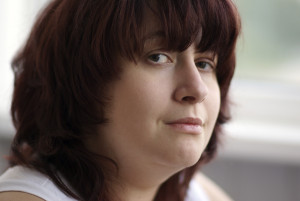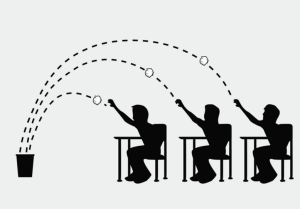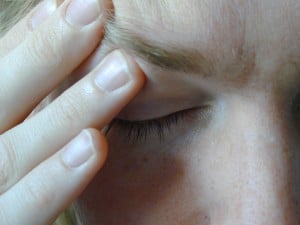Originally published on xoJane and republished here with their permission.
(Content Warning: bulimia, bingeing and purging practices, fatphobia, discussions of weight that suggest the existence of a standard “normal” weight)
My eating disorder started, like so many others, with a diet.
I lost over 30 pounds through a combination of exercising and increasingly restricting my calories.
For me and a lot of other disordered eaters, calorie-counting is addictive. Eating less was an exciting, challenging, horrible game.
Losing meant verbally abusing myself (or worse) for hours, but there was no such thing as winning, only not-losing. Not-losing earned a brief moment of acceptance that I was not a total failure, but there was no break from the self-punishment of restriction. A successful day of counting calories only leads to another day of counting calories.
The drudgery of restrictive eating was only broken by binges. A binge, which might be an entire 14-inch extra cheese pepperoni pizza with a whole ten-inch dessert pizza, or two orders of chicken tikka masala with three ten-inch cheese naan, or any other combination of way too much delicious food, gave my body a break from restriction.
But the physical comfort of a binge was nothing compared to the mental comfort it gave me. Sitting down to literally all the food I could possibly eat was liberating.
Not only was I freeing myself from counting calories, but I felt like I was blocking out all of the negatives in my life. A binge gave me temporary shelter from everything else.
One of the many negatives of frequent bingeing is rapid and unhealthy weight gain. My binges had been partially triggered by restricting, but they were undoing all the weight loss I was trying to achieve through that restriction.
Because I couldn’t stop myself from compulsively bingeing, I decided I had to start doing something afterwards to prevent myself from gaining weight. I needed to get rid of the calories my body didn’t need, and I was willing to do whatever it would take to cleanse myself of the extra food.
At first, my solution to erasing binges was to take laxatives immediately after a binge and to restrict calories the next day. It’s worth noting that medical professionals say that laxatives do nothing at all to stop you from taking in calories.
Any weight loss that seems to come from laxatives is really just water (or waste) weight. Regardless, taking laxatives to purge a binge is still considered eating disordered behavior.
Once, after a week or two of laxative abstinence, I took six times the recommended dose, thinking my body would still be able to handle the amount I normally took.
But because my body was re-sensitized to the laxatives, I reacted badly to the overdose. After hours of early-morning diarrhea and horrible cramps, I started involuntarily throwing up bile because I had gotten so dehydrated. I was also shaky, cold, sweaty, and incredibly weak.
This laxative scare, combined with the fact that these little blue pills weren’t actually helping me lose weight, encouraged me to try something different. While forcing oneself to vomit is by no means safer than taking laxatives, it seemed more reliable calorie-wise.
If I was puking right after a binge, I thought, there was no way I could absorb any of those calories. I would be able to keep losing weight and essentially erase these sad, embarrassing binges from my body.
What no one tells you about bulimia is that there is a steep learning curve. Bodies hate throwing up food, and the types of food that a lot of people binge on (heavy carbs like pizza, pastries, and other bread products) are really difficult to get out.
It is not as easy as sticking a finger down your throat and instantly barfing up all your food. Purging takes a lot of work, and even more so when the food is heavy. When I first started purging, I would easily spend an hour or two in the bathroom trying to get all of a binge up. Even after following all the online “pro-mia” tips I could, I was still never satisfied with the amount I’d purged.
While I was trying to get better at purging, I had gained back ten of the thirty pounds I had worked so hard to lose. Instead of realizing that this was a horrible and ineffective way to try to lose weight, the weight gain only made me more determined.
Once I got faster and more effective at purging, I thought, I would completely erase my binges and would start losing weight again. Since the learning curve to bulimic efficiency was so steep, I started seeing a therapist to see if I couldn’t stop bingeing altogether instead.
The therapist diagnosed me with bulimia and depression. Unfortunately, by the time I sought clinical help, I had gained even more weight back, and was already back at an obese BMI.
Purging after a binge soon turned into purging whenever I could. Though I kept bingeing, I also started purging after a largish meal, or purging after I ate even small or appropriate amounts of certain triggering foods.
My purging habit led to some disgusting scenarios, including throwing up dinner into the worm- and poop-filled pit of an unlit outhouse. While that might be the grossest thing bulimia led me to do, perhaps the most illogical part of my disorder was continuously convincing myself that it would help me lose weight.
Quite the opposite: I gained sixty pounds in the year after I was diagnosed with bulimia. This put me well into the obese BMI category, even though I had only been 10 pounds overweight when I started purging. The entire time, I truly believed that purging would eventually help make me thin.
I ignored therapists, doctors, and nutritionists who told me that continuing to binge and purge was making me gain weight. They said that both of these behaviors, especially when combined with calorie restriction, slow down your metabolism and deregulate your body’s natural digestive processes.
All of these behaviors usually result in malnutrition, so even if someone doesn’t gain weight, their health suffers considerably. To a medical professional, malnutrition is worse than weight gain, but to me, it was the opposite. As long as I was losing (which I wasn’t), I could give a damn if my body was malnourished. I refused to understand that bulimia was causing the one thing I was using it to prevent.
Seventy pounds later, I think I finally know better. My eating disorder has made me gain the weight of a small human. I weigh more now than I ever have in my adult life, and forty pounds more than I did when I initially started trying to lose weight.
Not only am I fat, but I still have bulimia. It is painfully ironic to have an eating disorder typically associated with thin, beautiful women but to have a BMI that’s quickly approaching 40. This irony only makes my symptoms worse.
A central part of many eating disorders, including mine, is an intense preoccupation with weight and body image, including a fear of being fat. Many eating disorder sufferers are convinced that they’re fat when their bodies are actually a normal or unhealthily low weight. Their eating disorder is lying when it says they’re fat. What happens when that isn’t a lie?
The core driving force of my eating disorder, that I am fat, is not a lie. Worse, I am not just slightly overweight; I am more than 80 pounds overweight. Even if I recover from bulimia, my body will not restore itself to a healthy weight the way that other eating disorder patients’ weights do. It pains me to even write it, but I might be fat forever.
I believe that I deserve to purge when I binge because I am fat, and I should punish my body by removing the excess calories that it doesn’t need. I believe that I don’t need to eat, because not only should I punish myself for looking this way, but I need to as much weight as I can as quickly as possible.
I am fat, and I believe that because of this, I deserve – and maybe even need – my eating disorder. Being obese is the worst, most unfathomable hell of someone with an eating disorder. I am living it.
Living a hell does not mean I will stay here. I am working to push bulimia out of my life. As a fat bulimic who’s trying to recover, I allow myself to hate my body with frightening passion.
But I also accept that in the present, I wear a size 18 jeans and extra-large shirts. I accept that the newest twenty pounds that I’ve gained make it hard to walk or find clothes. Just like my fatness, these are facts that will not change immediately.
Many people, including fat acceptance activists, ED recoverers, and therapists, might say that I should love my body the way it is, right now, without exception. Not only is this impossible for me, but I don’t think I need to love my body in order to recover, or at least to start recovery.
I can hate it while also tolerating its existence, accepting that I need to feed and water it, accepting that I need to keep it healthy in order for it to work properly, and hoping that someday I won’t see it as quite so hideous. I am working to stop using restriction and purging as punishments for my body.
Just as I may be fat forever, I may hate my body forever. Bulimia is not the first eating disorder I’ve had, and feeling uncomfortable in my skin is something I’ve experienced for most of my life.
As a fat woman, I get a lot of body hate from other people, which ranges from subtle to harsh, direct comments about my weight. With such a hostile sociocultural environment, keeping a positive attitude about my body would be hard even if I didn’t have an eating disorder.
Knowing that other people also find my body to be unacceptable helps my eating disorder win. By accepting my feelings but not letting them determine my actions, I am working to stop my body destroying itself from the inside out.
[do_widget id=’text-101′]

Search our 3000+ articles!
Read our articles about:
Our online racial justice training
Used by hundreds of universities, non-profits, and businesses.
Click to learn more
Most Read Articles
- « Previous
- 1
- …
- 30
- 31
- 32




















